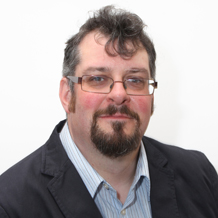‘You’ll have to excuse my lack of voice’ says Dr Insley as I take a seat opposite him, on a desk stacked with papers. The office is crammed with books and paperwork, the hard labour of a university history professor, just returned, so he tells me, from a conference. Famous amongst students for his fantastic dress style of tweed suits and a pocket watch, Dr Charles Insley has been a senior lecturer in medieval history at the University of Manchester since 2012.
Born in Coventry, Insley was the son of a history teacher, evidently where the passion began, having grown up ‘surrounded by history books.’ His father was a secondary school history teacher with an interest in 19th and 20th century history, distanced then, from the saxon forts which comprise a part of Insley’s own historical interest. ‘I can’t remember not being interested in history, in somewhat shape or form’ he tells me. He explains how a lot of this history around Coventry was lost after most of the structures were leveled during and after the Second World War, ‘But if you knew what to look for, you could still see the bits of medieval Coventry.’
It was at twelve, however, after seeing ‘In search of the Dark Ages’, the BBC documentary presented by Manchester’s own Michael Wood, that Insley discovered his passion for early medieval England. ‘It made me aware just how interesting and exotic, this medieval past was, because it was so remote.’ After studying early modern and modern history all through school, he was determined, he says, to do as little of that history as he could, and therefore ‘made a beeline for the medieval courses.’
Insley went on to study History in Worcester College at the University of Oxford, being taught by the renowned and ‘inspirational’ medievalist Professor James Campbell. ‘My original plan before university’, he says thoughtfully, ‘was to be a lawyer’ but he was advised to study history and then look into a conversion course, the path blazed by many history undergrads. Halfway through his university career, however, he was immersed in Anglo-Saxon history and ‘it turned out I really, really enjoyed it!’
From there he went on to do his PhD, doing a year as a probationary research student, and then working on a collection of Anglo-Saxon documents from exeter Cathedral whilst three more summers were spent down in Devon on field research. ‘It was in this archive looking at documents that are a thousand years old and it was like looking through the eyes of the person that was writing it.’ All of this resulted in the culmination of Insley’s university career, his 100 000 word thesis on Anglo-Saxon Devon from 700 to 1066.
From here, he went on to do two years at Bangor University as a research assistant. This was followed by seven years working for a local history project based in Northampton, which looked at ‘anything and everything, from modern transport, modern industry to medieval settlements, medieval churches.’ Insley then moved on to be a lecturer in medieval history at Canterbury Christ Church University a post he remained in up until 2012, when he moved to be a lecturer at the University of Manchester. ‘
We begin to talk about the idea of a British identity that has its foundations in Insley’s Anglo-Saxon world, a factor claimed by many groups. ‘In the English national story, 1066 and the Norman conquest form such a huge transformative event that theres a thousand years of history that sees the Normans as the basis,’ he tells me,’so that the Anglo-Saxon world is almost deliberately disconnected, something that makes it seem even more remote. But we still speak the language that our forbears spoke before 1066.’
We turn to his current projects and he tells me he will be on leave next year to work on a project looking at landscape and agricultural change and the emergence of the English Kingdom in the tenth century, focussing on the processes that allowed one dynasty to dominate. The result, he says, will be a book- something that will feature on the reading list for his first year course, The Making of Europe, I ask? ‘Certainly will’, he replies with a chuckle.
For the future, Insley tells me how he hopes to embark on a project to catalogue Latin manuscripts in the John Rylands Library, a huge undertaking, but one he looks forward to. I thank him and get up to leave but struggle to find the door handle in his forest of coats, perhaps a useful analogy of Insley’s personal search for secrets of the Anglo-Saxon world, lost in over 1000 years of history, waiting to be rediscovered. Certainly, he is a man with a passion for a time that many have forgotten, a passion that has inspired many students to pursue an interest in medieval history, and one that will continue to do so for years to come. I wish him all the best for the future!

